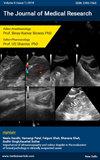A Survey on Junior Nurses’ Risk Perception Level and Its Influencing Factors
引用次数: 0
Abstract
[Objective] Junior nurses’ perceived risk level may affect their career satisfaction and performances. This study sought to investigate the current situation of risk perception level of junior nurses with undergraduate degrees and to determine its influencing factors, with the aim to provide a reference for nursing managers to carry out targeted training and education for junior nurses. [Methods] A total of 484 junior nurses with undergraduate degrees from five tertiary hospitals in Guangdong Province were selected by the convenience sampling method as the research participants. The general information questionnaire, risk perception questionnaire and the Chinese version of the Positive and Negative Affect Schedule (PANAS) scale were used for the survey. [Results] The enrolled junior nurses scored 85.84±13.56 (Full score was 100) on the risk perception survey. Working years, positive and negative affect, gender, and personality characteristics were the main influencing factors for junior nurses’ risk perception levels (P<0.05). [Conclusions] Junior nurses' risk perception was at a moderate and acceptable level. However, their risk perception was higher in dimensions such as physical function, occupational exposure, and time. Therefore, nursing managers should pay attention to high-risk perception items, and targeted measures should be taken according to different characteristics of nurses to improve their ability to correctly recognize risks and eliminate negative emotions in order to improve the quality of nursing services.初级护士风险感知水平及其影响因素调查
[目的]初级护士感知风险水平对其职业满意度和绩效的影响。本研究旨在调查本科初级护士风险感知水平的现状,并确定其影响因素,为护理管理者对初级护士进行有针对性的培训教育提供参考。[方法]采用方便抽样法,抽取广东省5家三级医院本科以上初级护士484名作为研究对象。采用一般信息问卷、风险感知问卷和中文版的积极与消极影响量表(PANAS)进行调查。[结果]入组初级护士风险感知调查得分为85.84±13.56分(满分为100分)。工作年限、积极情绪与消极情绪、性别、人格特征是影响初级护士风险感知水平的主要因素(P<0.05)。[结论]初级护士的风险认知处于中等可接受水平。然而,他们在身体机能、职业暴露和时间等维度上的风险感知更高。因此,护理管理者应重视高危感知项目,并根据护士的不同特点,有针对性地采取措施,提高护士正确识别风险、消除负面情绪的能力,以提高护理服务质量。
本文章由计算机程序翻译,如有差异,请以英文原文为准。
求助全文
约1分钟内获得全文
求助全文

 求助内容:
求助内容: 应助结果提醒方式:
应助结果提醒方式:


